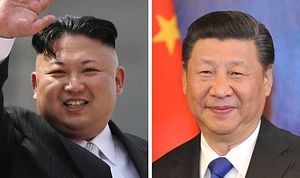The top leaders of China and North Korea have had a second meeting, close on the heels of their first summit from March 25-28. Chinese President Xi Jinping and North Korea’s Supreme Leader Kim Jong-un met in the northeastern Chinese coastal city of Dalian on May 7 and 8, Xinhua announced. As with the previous Xi-Kim meeting, there was no advance notice given, and the visit was only confirmed after Kim had left.
As the location suggests, this meeting was more informal than the two men’s first summit in Beijing. Kim’s two-day visit included a welcome banquet, luncheon, and even a stroll on the beach with Xi. Xinhua noted the “cordial and friendly atmosphere” of the visit in a write-up that stressed the strength of China-North Korea relations.
Noting that this was Kim’s second trip to China in just over 40 days, Xi praised the state of “strategic communication” between China and North Korea, formally known as the Democratic People’s Republic of Korea (DPRK). At the earlier summit, Xi had emphasized the need for regular high-level talks and increased strategic communication; this week, he noted approvingly that the plan was being well-implemented.
Xi and Kim both pointed out that since their initial summit there had been “positive progress” not only in China-North Korea relations, but in the general situation on the Korean Peninsula. Kim in particular suggested that the noticeable diplomatic progress was due to “the positive outcomes of the historic meeting between me and Comrade General Secretary [Xi].”
Kim said he had come to China to inform Xi of the situation, as events on the Korean Peninsula are unfolding rapidly. Indeed, despite the short turnaround between Xi and Kim’s meetings, there was a lot to catch up on. This second Xi-Kim meeting came after the inter-Korean summit on April 27, and a day ahead of a trilateral summit between Chinese Premier Li Keqiang, South Korean President Moon Jae-in, and Japanese Prime Minister Shinzo Abe in Tokyo, at which North Korea is expected to top the agenda. The timing of the Xi-Kim meeting allowed them to emphasize their shared interests ahead of the trilateral summit, and before a meeting between Kim and U.S. President Donald Trump, expected in the next month or so.
In light of the ongoing diplomatic efforts, the goal here was for Xi and Kim to present a united front. Xinhua reiterated that Kim and Xi had “fully exchanged views and reached important consensus” on the Korean Peninsula issue at their first meeting. Those views were repeated again at this meeting. Xi restated China’s support for North Korea’s “adherence to the denuclearization of the peninsula” as well as “the dialogue and consultation between the DPRK and the United States for resolving the peninsula issue.”
According to Xinhua, Kim repeated his commitment to denuclearization, with the usual caveats in place: “As long as relevant parties abolish their hostile policies and remove security threats against the DPRK, there is no need for the DPRK to be a nuclear state and denuclearization can be realized, he [Kim] said.” Xinhua also paraphrased Kim as giving the slightest hint of what sort of outcome we can expect from the upcoming Trump-Kim summit. According to Xinhua, Kim:
expressed the hope that the DPRK and the United States would build mutual trust through dialogue and relevant sides would take phased and synchronous measures in a responsible manner so as to comprehensively advance the political settlement of the Korean Peninsula issue and eventually achieve denuclearization and lasting peace on the peninsula.
Previous agreements over North Korea’s nuclear program – including the 1994 Agreed Framework and the 2005 Joint Statement from the Six Party Talks – also called for phased, incremental steps for North Korea to dismantle its nuclear program alongside sanctions relief and normalization of relations with the United States. The devil, as always, is in the details of what these steps will look like, how they will be verified or enforced, and what the end goal looks like for the Korean Peninsula (including the question of the U.S. troop presence).
Kim also briefed Xi on domestic developments in North Korea, which won approval from Xi. He had particular praise for Kim’s new focus on the economy, along with an announced end to nuclear testing. As I noted after the first Xi-Kim summit, China has long hoped to encourage North Korea to take a cue from Beijing and open economically. It’s no surprise then that, as Xi said, China “supports the DPRK in shifting its strategic focus to economic construction” in line with Kim’s recent declaration that no more nuclear tests were needed.

































